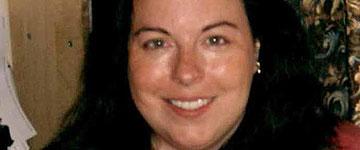
December 2007
Ann Feuerbach '90
Q & A:
- What is your edge (strength)?
3-D thinking. I have degrees in the arts, sciences, and humanities, so when I look at an object, I see the materials it is made of, the actions which were needed to create it, and the cultural influences that affected its production and use. - What at Hofstra gave you your edge?
Being able to have a dual major and take a wide variety of courses. - What is your field of specialty, and how did you come to work in the industry?
I am an "archaeological scientist" - I have always wondered how you get from "ore to object." Once I received my doctorate, I had the good fortune of becoming an adjunct professor here at Hofstra. - What was your first job after graduating from Hofstra, and what was the most valuable thing you learned there?
Working for a painting conservator (via an internship in Hofstra's Art History Department). I learned that the field of art and archaeological conservation actually existed, and I learned how to study and care for antiquities. - What is the single most rewarding experience in your career thus far?
Being considered an international "expert." I really get satisfaction from being referred to in other people's publications as the "world expert" on crucible "Damascus" steel swords. - Who in your field do you most admire?
Dr. Paul Craddock, who has retired from the British Museum Research Labs. He knows a lot about so many different subjects, and has particular expertise in how culture influences object production. - What was your major?
I had a dual major in anthropology and art history. I had wanted to study anthropology from the time I was 2 years old and my father took me looking for Native American arrowheads! - What was your favorite class?
Professor Doug Hilson's class, which met in NYC so we could visit current gallery exhibitions to discuss contemporary art and meet the artists themselves. - What is your fondest memory of Hofstra?
Through the Anthropology Department, taking a field trip to Mexico with Professor Anne Buddenhagen. It was my first time visiting another country. - In one word, how would you describe Hofstra?
Fun! - What advice would you give current students?
Learn as much as you can, because you never know what information will prove to be useful in your future. I started out in the arts and ended up in the sciences. No knowledge is bad knowledge! - How do you balance work and life?
My husband is not an academic - he is a guitarist and a "biker." He fortunately balances me; otherwise, I would spend all my time on my academic pursuits! - Where do you see yourself in 10 years?
I see myself as a published author, teaching, and running a successful consulting business that helps individuals, educators and businesses to understand the relationship between people and commodities, including product genesis and improvement. - Your work in anthropology has taken you across the world. What has been your most memorable experience in the field?
Camping in western Siberia on an archaeological excavation to identify an ancient furnace, and excavating in Turkmenistan. - You currently teach at Hofstra. How important is it for a professor of anthropology to have done field work, when it comes to relating the course work to students?
"Truth is stranger than fiction." It is important to be able to quote from first- hand experience when relating course work to students. Having first-hand observations and anecdotes also serve to make the classes more entertaining. It makes anthropology "real," not just something read in a book. - Hofstra anthropology majors want to know …what kinds of jobs are available in the field upon graduation?
Because anthropology is the study of people, you can really go into any field. The study of anthropology helps you learn what motivates people and how they behave and interact with one another. - What qualities, in your opinion, does a successful anthropologist need to possess?
Open-mindedness and the willingness to try anything once. Good anthropologists must be able to see things from other people's - and other cultures' - points of view. It is only with the expansion of our own cosmology [world view] that we understand ourselves and become more open to others.

Dr. Ann Feuerbach earned an undergraduate degree in anthropology/art history with a minor in fine arts at Hofstra in 1990. She then pursued a master's degree at New York University and traveled overseas to garner more academic accolades, receiving a second bachelor's degree and master's degree, in addition to a doctoral degree, at the University College London, Institute of Archaeology. While in London, her research interests grew to include the study and conservation of art and artifacts, particularly the production of crucible "Damascus" steel swords from Central Asia. She currently serves as adjunct assistant professor of anthropology at Hofstra.
Ann has traveled throughout the world pursuing her research interests, most recently examining arms and armor collections in museums in Northern India and undertaking archaeological excavations in Turkmenistan, Russian Northern Caucasus, Western Siberia, Cyprus, and Bulgaria, among other places.
Dr. Feuerbach has published several scholarly articles, including "The Conservation of Wet Medieval Window Glass" and "Crucible Damascus Steel: A Fascination of Almost 2,000 Years." In her spare time, she enjoys pondering the relationship between people and objects and spending time with her husband, Pete.